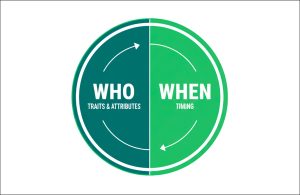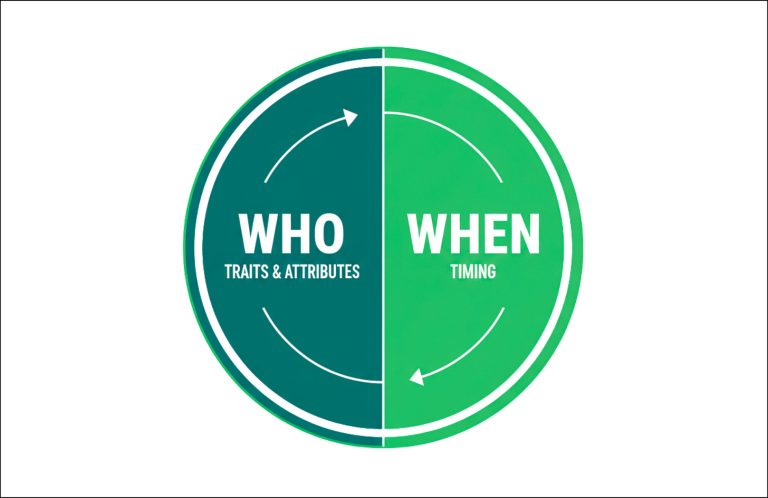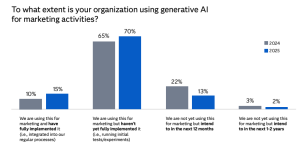
Artificial intelligence promises tremendous value for marketers, but only if it’s fueled by quality data collected responsibly. That was the theme of a session at the September installment of The MarTech Conference.
Moderated by MarTech contributor Melissa Reeve, the panel gathered enterprise AI consultant Anthony Coppedge, Alex Cash, director of strategy for consent-based solutions at OneTrust, and Adam Eisler, legal counsel at the Interactive Advertising Bureau (IAB) for a candid discussion about data, governance and consumer trust in an AI-driven world.
Six panel discussions on data and AI, available on-demand when you log in or register. Watch now for free.
The data landscape is shifting
Cash pointed to a coming paradigm shift when asked about the most significant changes marketers must adapt to.
“The way that these AI products operate today and their ability to interact with voice wearable devices… There is a very real possibility that in the future we talk about AI outside of the context of the browser and the mobile app,” he said.
Dig deeper: Privacy is the new currency in digital marketing
Eisler highlighted the new dynamics of the AI era.
“It’s not just how companies use AI, it’s also how AI uses those companies,” he said.
Coppedge stressed that transparency now underpins brand trust:
“Customers want to know what AI is doing and what AI is doing with the customer’s data,” he said. “Show them the way their data is used… that would actually, I think, boost engagement.”
Reeve added that AI democratizes data use for marketers who previously relied on specialized teams. “So often we’ve had to rely on others for the collection, processing, [and] analysis of data,” she said. “And I feel like AI is going change that for marketers.”
Governance must be agile
The panel also discussed how traditional governance frameworks are too slow for the AI era. Coppedge argued that organizations need adaptive approaches like transparency through dashboards that show users how data is being used.
Eisler warned companies not to wait for lawmakers to dictate the rules.
“Definitely don’t wait. Waiting, in the end, put a lot of companies that chose to wait at a disadvantage because the companies that took a more privacy-proactive approach were in a position to hit the ground running,” he said.
Eisler also reminded the audience that privacy frameworks already cover AI activities.
“There is no AI carve out in existing state comprehensive privacy laws. All states include the right to opt out of targeted advertising. All states require consent to process sensitive personal information,” he said.
Consent and the ‘unbaked cake’ problem
Cash emphasized that not all AI uses are alike. Governance must account for whether companies are deploying embedded AI or training models themselves:
“There is a big difference between using a product that has a native LLM baked into its capabilities versus training a model in-house,” Cash said. “It’s really important to distinguish… what are the products… and in which mode am I using them?”
He also warned that traditional consent mechanisms break down when applied to model training.
“One of the key concepts of consent is that you need to be able to withdraw it,” he said. “If you train a model on someone’s data and then they withdraw… Do I roll back the model? You can’t un-bake a cake.”
Who owns governance?
The question of ownership generated strong opinions. For Cash, marketers must step up.
“Marketing teams must be at the same table with privacy and with our governance and risk teams,” he said. “We like to use this expression of ‘govern well, move fast.’”
Coppedge argued governance can’t be siloed.
“I don’t think it’s a business unit that owns it,” he said. “You’re going to want to have a group effort. I think it’s too dynamic for that.”
Reeve tied it together with the idea of dynamic, layered oversight.
“We’ve gotta move from static to dynamic, a cross-functional group at the top, another layer and AI leads or champions on the front line,” she said.
Looking ahead: The next 18 months
Asked to predict near-term disruptions, the panel pointed to three areas:
Legal and IP questions
Eisler said copyright and fair use disputes will shape marketing tools. “By the end of 18 months, your marketing teams should have a handle of what your AI use cases are,” he said. “Have you seen an actual ROI or is this just… hype?”
Dig deeper: 5 tips for marketers planning to evaluate B2B data vendors
New marketer skill sets
Coppedge predicted a hybrid professional. Tomorrow’s marketer needs to be part data scientist, part ethicist and part storyteller,” he said. “Orchestrate ecosystems of trust and personalization.”
Agent-to-agent ecosystems
Cash foresaw AI agents disrupting how marketers access data.
“There have been developments on this concept of agents. This is going to have potentially a really big impact on the marketing data that marketers are able to acquire,” he said.
Takeaways for marketing leaders
The panel’s message was clear: AI adoption can’t wait for perfect laws or static playbooks. Success depends on building trust through proactive, transparent, and agile governance.
Key actions for marketers
- Act now: Use existing privacy frameworks to guide AI programs.
- Make transparency tangible: Dashboards and plain-language explanations foster trust.
- Distinguish AI use cases: Deploying AI tools vs. training models requires different safeguards.
- Share responsibility: Governance is cross-functional, with marketing a core stakeholder.
- Skill up: Future marketers must blend data fluency, ethics, and storytelling.
As Reeve concluded, governance must evolve “from static to dynamic” — adapting as quickly as AI does. For marketers, that means embracing new tools and responsibilities to shape how customer trust is earned and maintained.
The post Navigating the chaos of consent, compliance and customer trust in an AI world appeared first on MarTech.





















